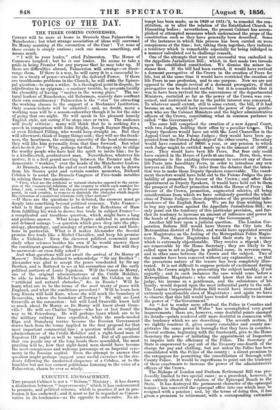THE THREE COMING CONGRESSES.
Cowan. will be more at home in Brussels than Palmerston. in Manchester ; but what strange association of ideas will surround De Morny assisting at the coronation of the Czar ! Yet none of these events is simply curious; each one means something, and means much.
"I will be your leader," cried Palmerston. The House of Commons laughed ; but he is our leader. He seems to take a pride in being Premier for any purpose that he may take up. If there are difficulties abroad, Palmerston will arrange—or disarrange them. If there is a war, he will carry it to a successful issue in a treaty of peace—evaded by the defeated Power. If there are troublesome problems in the Church, he will settle the Episcopal question—to open a wider. Is a theological point in dispute, he adjudicates in an epigram ; a sanitary trouble, he presents lucidly the absurdity of having "matter in the wrong place." The natural leaders of Manchester, old Reformers, scarcely dare confront their own constituency : Palmerston is the " star " for attracting the working classes to the support of a Mechanics' Institution. Only season-tickets will be admitted ; and, no doubt, many a working man will be a season-subscriber though it be for the sake of going that one night. He will speak in his pleasant homely English style, not caring if he stops once or twice. The audience will freely criticise; many will think that he is nothing for a speech in comparison with John Bright, Joseph Rayner Stephens, or even Richard Pilling, who would keep straight on. But they will afterwards think of happy things said.; they will see the frankness, the heartiness, the seeming sincerity of the head statesman ; they will like him personally from that time forward. But what does he do it for ? Why, perhaps for that. Perhaps only to oblige the worthy people who have had the spirit to invite hum; for he is a kindhearted, goodnatured man. Nevertheless, whatever his motive, it is a first grand meeting between the Premier and the democratic " workies," over the heads of the Manchester leaders.
At Brussels, towards the end of next month, if he can be drawn from his Sussex quiet and certain sombre memories, 'Richard Cobden is to assist the Brussels Congress of Free-trade notables in solving these two questions
" First, what are the artificial or natural obstacles opposed to the extension of the commercial relations of the country to which each manlier belongs ? and, second, What are the practical means proposed, or to Ite proposed, in each country, to remove or diminish the obstacles which impede the extension of commercial relations with other nations ?"
—If these are the questions to be debated, the answers must go deeply into something beyond political economy. Take France— what is it that prevents the author of the Reflections of Ham from fulfilling his wish to decree free trade in subject France ?— a complicated and troublous question, which might have a long and perilous answer. What keeps Naples addicted to protection and debased coinage ?—a question which goes deep into the physiology, phrenology, and nosology of princes in general and Bourbons in particular. What is it makes Alexander the Second promise free trade like a Michel Chevalier, and keep his promise like a Nicholas ? Even the cleverest political economist must study other sciences besides his own if he would answer these the constituent questions of the Brussels Congress. But will they be answered—or even fully asked ? And what questions will not await the arrival of De Moray at Moscow ! Nicholas declined to acknowledge "Sir my Brother " : Alexander was glad to accept the peace vouchsafed by Sir my Brother, and is flattered to see at his coronation one of the early political partners of Louis Napoleon. Will the Count de Moray, one of the original administrateurs of the Credit Mobilier, be able to inform M. Michel Chevalier and Mr. Cobden on the "artificial and natural obstacles," &c. in. Russia ? Will he learn what are to be the terms of the next treaty of peace with England, and what the conditions precedent ? Will he learn how long Russia will hold Kars, where she will mark the boundary of Bessarabia, where the boundary of Norway? He will see Lord Granville at the coronation : but will Lord. Granville know half so much about De Moray as De Moray will know about Granvile? He will see Charles Napier—who has at last found the way to St. Petersburg. He will perhaps learn which are to be the military railway lines expedited, while the much-needed Riga and Dunaberg tarries because the Russian Government draws back from the terms implied in the first proposal for that most important commercial line ; a question which an original administrateur of the Credit Mobilier and a right-hand man of Napoleon III ought so well to understand. But of all questions that can puzzle any of the long heads there assembled, the most puzzling will be, how that right-hand man should have become the most conspicuous and welcome personage at an Imperial ceremony in the Russian capital. Even the attempt to answer that question might perhaps suggest some useful exercises to the students following the unadorned eloquence of a Cobden, or to the humbler but not less earnest politicians listening to the voice of a Palmerston, charm he ever so wisely.
























 Previous page
Previous page